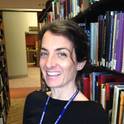Presentation
e-Science @ the University of Massachusetts
NERCOMP Annual Meeting
(2009)
Abstract
e-Science @ the University of Massachusetts Abstract: What is e-Science and how can libraries and librarians support it? The University of Massachusetts takes a proactive approach to support network-enabled research on its campuses and provides examples where e-Science is already at work. Statement: “e-Science” is a term commonly used to describe research in a networked environment, a growing trend not only in the sciences, but the arts and humanities as well. e-Science creates both opportunities and challenges for academic libraries. The opportunities lie in leveraging the basic skill set that libraries and librarians already possess: the knowledge of and practical experience with metadata standards, the ability to curate, preserve and provide access to information, the long-standing relationships and collaborations with researchers, and the service model based on providing access to and assistance with aggregated resources (research databases, journals, archives). The challenges lie in reorienting those basic skills so that libraries can be involved earlier in the research cycle, accommodate new tools and resources, and support a dynamic research environment. Description: At the University of Massachusetts, an effort is underway to anticipate and support e-science initiatives across the five-campus system. An ad hoc Committee of Science Librarians was convened in March of 2008 to discuss the challenges of e-Science, particularly for the Life Sciences. From that initial meeting, the Committee has begun taking steps to prepare the Libraries for e-Science in the following ways: by establishing our own set of Principles Fundamental to the Role of the University of Massachusetts Research Libraries in e-Science, modeled on the principles presented by the ARL Joint Task Force of Library Support for e-Science in its Report, “Agenda for Developing e-Science in Research Libraries” (Joint Task Force on Library Support for E-Science, Association Research Libraries, 2007); by planning and organizing an e-Science Symposium to be held in the spring of 2009 to open a dialog between research faculty and librarians and to identify and establish fruitful collaborations; and by identifying current efforts on our campuses that already embody Jankowski’s conception of e-science. Outcome: Existing University of Massachusetts projects demonstrate the changing role of libraries and librarians, among them the Massachusetts Medical Device Development Center, a collaboration between the Worcester and Lowell campuses, and InterNano, an information portal for the nanomanufacturing community created through collaboration between the NSF Center for Hierarchical Manufacturing and the University of Massachusetts Amherst Libraries. With these examples and with the ongoing efforts of the ad hoc Committee of Science Librarians, the University of Massachusetts information science community is actively working together with communities of information producers/consumers for a common purpose, the advancement of science.
Disciplines
Publication Date
March 11, 2009
Citation Information
Maxine G Schmidt, Rebecca Reznik-Zellen, Raquel Rivera and Cecilia P. Mullen. "e-Science @ the University of Massachusetts" NERCOMP Annual Meeting (2009) Available at: http://works.bepress.com/rebecca_reznik-zellen/6/
